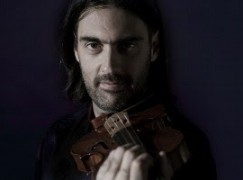New York City Opera gets out the begging bowl
mainOne of the last acts of City Opera before it collapsed under George Steel’s management was to attempt crowdfunding, seen as a desperate act for an established company.
Now it looks as though the revived City Opera is getting into trouble again with an uninspired appeal.
Read this:
Last week you heard about our exciting commission for the 2018/19 season—Stonewall. You read about the incredible creative team we’ve assembled including composer Iain Bell, Pulitzer Prize-winning librettist Mark Campbell, and Broadway veteran director Leonard Foglia. You helped spread the word about this exciting project commemorating the 50th anniversary of the Stonewall uprising to your friends, family, and social media communities.
Now, “The People’s Opera” is excited to share how you, the people, can own a piece of this historic production!
Today we are launching a campaign via Patreon allowing you to commit to a monthly gift in support of Stonewall. You can even choose which part of the opera you would like to support—from production elements like lighting, set design, and costumes, to supporting talent right down to the breakroom tea and honey for our hard-working singers.






I’m all for City Opera getting back on its feet. Give the Met some competition, and give the people another operatic option (I’m being sentimental because I have good memories of City Opera – much more than the Met).
I too am all for the New York City Opera getting back on it’s feet, but I feel it needs to work on a couple of things.
First, it needs to find a better venue for it’s performances than that infernal “Rose Theater”. It has horrible acoustics for opera.
Secondly, they need to have their website be more user friendly in terms of finding information. I also hate the way they don’t announce casting when they announce the upcoming season. Last year, they announced this past season and began selling subscriptions with virtually no cast listings. This is absurd. I don’t know of any opera-goer that would buy tickets to an opera without knowing who is singing. Just sayin……
Thanks! Just made a monthly pledge.
How will a contemporary composer write music about Stonewall without resorting to disco and other trashy kinds of music? It sounds like an exercise in tastelessness.
Last night my wife and I saw Achim Freyer’s iconic production of Der Freischutz at the Sttutgart Opera. It’s been running for 38 years and the house was still packed. We had seats in the fourth row which cost about 1/5th what they would have been at a comparable house in the USA. The house is owned and operated by the Baden-Wurttemburg state government, and runs full time all year. It’s one of 9 full time state owned and operated houses within a two hour drive from our house. That’s how you have people’s opera.
Stuttgart is also currently running Britten’s Death in Venice and a double bill by Luigi Dallapiccolo and Wolfgan Rihm — something made possible since their funding system is centred around generous public funding. Too bad the America’s cultural life is crippled by its funding system. The Vox program of new operas ran by City Opera was an essential and vital part of America’s cultural life. It was lost when the company collapsed. What a tragedy.
I’ve often disagreed with Mr. Osborne in the past on various issues but here, he couldn’t have hit the nail squarer on the head if he’d tried. It’s a question of priorities, what we consider important for the education our society. Even if the stagings of a certain percentage of Germany’s opera productions rankle with many, the beauty of it all is that they’re able to exist in the first place. The fact there is government policy to enable a cultural debate is worth its weight in gold.
I still think that one has to recognize and accept the current state of affairs that the kinds of musical art that visitors to this site most care about hardly amounts to a hobby among a small proportion of the aging. At least in NYC, which is the only place I can speak of with any experience. Only a very small portion of people under 60 care about this music. It’s foreign to everyone else, has too many unpleasant and elitist associations tied to it, and lasts far longer than their attention spans are prepared to endure. 3 minutes. If people grow up knowing nothing about this kind of music and never interacting with it, we can’t expect them to fall in love with it as adults, no matter what gimmicks we trot out to get their attention. The NYCO was initially a city supported institution because at that time NYC’s middle class population (mostly European immigrants and their children, cared about opera. It believed in providing a training ground for young singers, it loved the old favorites, and it believed in developing a repertoire past Puccini – especially an American one. These people and these interests hardly exist anymore. Every day I interact with an abundance of college educated people for whom the names Verdi, Bartok, Mahler, and the like mean nothing. This is not uncommon. There simply is no constituency for “classical” music for the time being. So, trying to revive the NYCO is a honorable effort, but I don’t see a constituency for it right now. I hope I’m wrong. I really do, but I’m not optimistic.
I agree with much of what Dan P writes – but not the part “It’s foreign to everyone else, has too many unpleasant and elitist associations tied to it, and lasts far longer than their attention spans are prepared to endure. 3 minutes.”
Concert and opera going may be foreign. Some of the classical repertoire is not. Hundreds of millions of people have been attracted by Verdi, Bartok, Mahler, Mozart, R and J Strauss and a whole panoply of other composers. Many will have enjoyed the experience. But the music they heard happened to be in a cinema as part of movies like Pretty Woman, The Shining, Death in Venice, Amadeus and The Shawshank Redemption, 2001: A Space Odyssey and so on. Many years ago when managing an orchestra in a part of the world where a knowledge of classical music was as barren as Dan P portrays, in an attempt to reach new audiences, we programmed special concerts with movements from or full-length classical works featured in the movies. The marketing hook was obviously on the movies themselves, but we packed those concerts, mostly with young people. Had we programmed Bartok’s Music for Strings, Percussion and Celeste in a regular concert, I cannot believe most of those young people would have had any interest.
As it turned out, as most left the concert hall after the first of these concerts, they had also completed a slip with their contact details so they could be informed of the next concert. Thereafter, every such concert was full. I have no idea how many eventually came to more regular concerts. But the very act of occasionally programming a classical concert featuring music associated with a popular film resulted in many people being exposed to an orchestra, a concert hall and a part of the classical repertoire for the first time – and enjoying the experience.
I have read that it used to be a common marketing tool to bring a well known popular show biz figure like Danny Kaye to “conduct” do a patter or sing at classical music concerts
There’s no point in complaining about the lack of public funding in the U.S. for one simple reason: it ain’t gonna happen. The nation is badly in debt and we spend a huge proportion of our tax monies on defense. Whether that’s right or not, I’m not going to debate here. The fact remains: public funding for new opera companies in the U.S. is not going to happen.
Furthermore, I would much rather see our tax dollars be put to practical daily matters, such as health care, senior housing, transportation and infrastructure – things that are already in decent shape in Europe these days (greatly thanks to the Marshall Plan, don’t you thing?). Personally, I don’t need 8 or 9 operas within 4 hours driving time. Maybe there are others who feel that need.
The Marshall plan was seventy years ago, and the end of the cold war was thirty years ago. I really do wish Americans would stop this ridiculous belief that Europe owes its infrastructure and prosperity to the US.
If you go back to the 1950s and 1960s, US infrastructure was fantastic. But if you don’t spend anything on maintenance then, eventually, it will fall into disrepair. Europe, largely, continued to maintain its infrastructure by spending serious public money on it.
I think there is a long term danger into turning budget priorities into an either/or situation. I believe strongly that it’s a false dichotomy. Although, I live in one of the few (only?) civilized countries where a significant proportion of the population believes only in the market place, I think that supporting the arts (and teaching children to understand what art means) is just as crucial as any basic service. Without the arts, what do we have? What we get from art is much more than many people understand: an interaction with history, ours and others; civilizations, humanity, and how to use our imagination. And, as musicians, we learn how to work cooperatively to create something much greater than ourselves. These are not trivial things and we need to take them seriously if we want to have a civilization that’s worth maintaining. Technology is nice, but art is an expression of who we are and if we want ultimately be to of value to those who come after us, we should use our collective resources to make something of value besides new phones that can turn on your dish washer.
Dan, I agree with you in principle. But take any of the major European nations, change their priorities to defense to the same degree that the U.S. already has, and then see what’s left over for the arts. I would dare say that they would quickly be in the same position.
As I said, whether we should be spending that much on defense is a big topic of debate, and I’m not about to begin that debate here. This isn’t the place.
If there is such a thing as a low cost ‘quick fix’, it’s to include mandatory arts education in our teaching system – both public and private.
Barry, I can’t disagree with you about arts education. I think that’s the first place to start. Cultural education creates a context for everything else in life. As for the government funding in Europe – I’ll leave that to people who actually know about these things. I can say, however, that such funding in the US has as more to do with local politics (which districts get money and which defense contractors contribute to which senator) than with national security. If you follow the money, you discover a lot about how policy is determined. And it’s very depressing.
I understand that Joan Kennedy, the influential senator Ted Kennedy’s ex wife wrote a book while she was still married to him on how to teach children to appreciate classical music. She was a classical pianist (although not professionally).
As far as “follow the money” is concerned, the National Endowment for the Arts was probably saved from the ax since the Trump budget wanted to eliminate it, because they wisely made grants, even if just a few thousand dollars, which covered every Congressional district.
Only older people attend classical music events? Well, I believe that around 20% of New York City is over 60 and the percent of older people is increasing. They too deserve a cultural life. Perhaps, it takes an older person, especially if he/she does not have classical music training, to appreciate the complexity of classical music instead of just being seduced by the “beat” in popular music of the anger of most hard rock. I know this is true for me.
One of the things that concerns me is that fewer cultural events are being made available to people of really limited means and that there are few truly “public events in New York City, or so it seems to me. For ex, although there is the $26 Opera in HD there are no longer free Met Opera or NY Philharmonic concerts in parks. There are fewer free concerts at Damrosch Park which is attached to Lincoln Center as well fewer concerts in Central Park.
At one time the Mostly Mozart festival gave substantial discounts to those who could show a monthly metro card, proving that he/she was dependent on public transportation . No longer.
Your comments only show that you either didn’t read the funding website thoroughly and/or don’t really understand arts funding in the United States.
The “old” City Opera tried to run a Kickstarter campaign to raise $1M. This was a desperation effort to stave off bankruptcy. The goal was unreasonable to achieve via a crowdfunding platform. Deficit fundraising is always hard and the time frame to avoid the bankruptcy filing was just not realistic. And so the company went under.
This new effort seems like a very innovative attempt to help fund a worthy project. It happens often in arts organizations. New York City Opera is trying to gain a cadre of patrons to support the creation of a new opera. There is no goal mentioned. Nowhere does this suggest that this is the only way they are trying to raise this money. It doesn’t seem like a desperation situation at all, but just another avenue to reach a wider base of support.
Patreon is a site that specifically funds new projects through a membership model. New music, new theater, and new literature are all projects that are listed on this site. Funding a new opera seems like a perfect match.
A little research and understanding of the subject would behoove you before posting destruction and ill-informed posts such as this.
One blogger implied that the NYC Opera had a season this past year? Where?
A large part of the problem is that a large David Koch grant to remodel what is now the David Koch theater had the remodeling done in what used to to be the NYCO season leaving the New York City Ballet season intact, apparently because Koch wanted to support the NYC ballet, not NYCO. NYCO never recovered from their loss of a season.
Furthermore I wonder how many people just stopped going because it is now the David Koch Theater, named after the big funder of the Tea Party anti tax, anti immigration, anti government movement. They may associate the theater with far right conservatism.
I wonder how many people know that about the time that grant was made, which was about a year before the Tea Party started, that the George W. Bush administration was going after Koch because of an explosion of an oil pipeline due to faulty maintainance which killed two teenagers.
Since large fines are negotiated I wonder if the 30 million dollar donation (or was it 300 million) was made to reduce the company’s assets so there would be less of a non tax deductible fine but instead a larger donation that would be tax deductible later?
This donation was supposed to go for remodeling the theater and introducing more sophisticated filming etc. Yet I have yet to see NYCB in HD or any other improvements to the theater except reupholstered seats. I know that the NYCB is not doing too well. Was some of the money used to make up a budget short fall?
Interesting. Thanks.